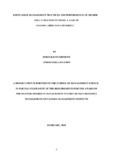| dc.description.abstract | The study aimed at establishing the relationship between knowledge management practices
and organisational performance in Higher Education Institutions; this was with regard to
practices of knowledge acquisition, sharing and application and their relation to improving
performance at Uganda Christian University. Using a cross sectional survey design,
quantitative data was collected using questionnaires administered to 59 academic staff in the
faculty of social sciences using simple random sampling. Qualitative data was collected by
means of interviews conducted with the faculty dean of social sciences, 3 heads of
department, the head human resources as well as the dean school of research using purposive
sampling. A content validity index of 0.80 and a Cronbach alpha co-efficient of 0.814
deemed the instrument of quality. Analytical techniques of correlation analysis and regression
analysis were applied to quantitative data while content analysis was applied to qualitative
data. Results show a moderate significant positive relationship between knowledge
acquisition and performance while the relationship between knowledge sharing, application
and organisational performance was a positive one yet quite weak in the human resource
perspective. Conclusively, knowledge management practices do play an integral part in
organisational goals. However, such practices have not been fully integrated into the
university’s strategy to realise organisational goals. Knowledge management practices should
have the sole purpose to create room for competent, skilled and knowledgeable human
resources to acquaint themselves with being effective and productive in their work
approaches than delivering knowledge concepts and content with little or no application to
realise performance. The study thus recommends: Coherent and strategic training for staff,
institute knowledge workers to initiate research activities, award excelling staff in their
research endeavours, institute knowledge sharing forums, training, research and publication
should orient lecturers towards being productive and effective in their work. The study also
presented recommendations for future research. | en_US |

